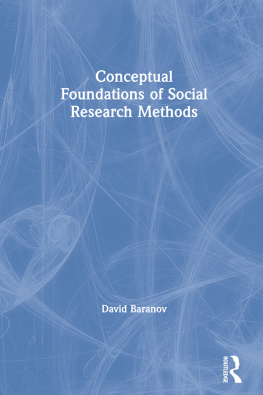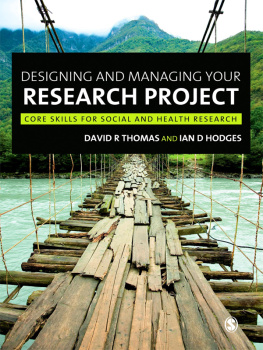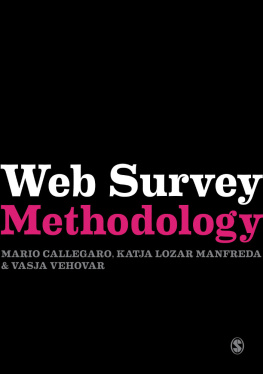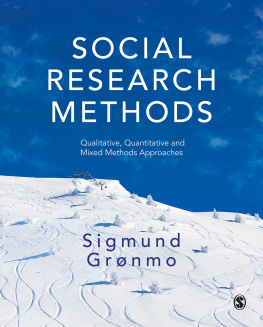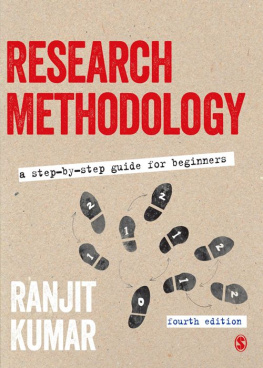Principles of Methodology
SAGE has been part of the global academic community since 1965, supporting high quality research and learning that transforms society and our understanding of individuals, groups, and cultures. SAGE is the independent, innovative, natural home for authors, editors and societies who share our commitment and passion for the social sciences.
Find out more at: www.sagepublications.com
Principles of Methodology
Research Design in
Social Science
Perri 6 and Christine Bellamy
Perri 6 and Christine Bellamy 2012
First published 2012
Apart from any fair dealing for the purposes of research or private study, or criticism or review, as permitted under the Copyright, Designs and Patents Act, 1988, this publication may be reproduced, stored or transmitted in any form, or by any means, only with the prior permission in writing of the publishers, or in the case of reprographic reproduction, in accordance with the terms of licences issued by the Copyright Licensing Agency. Enquiries concerning reproduction outside those terms should be sent to the publishers.
SAGE Publications Ltd
1 Olivers Yard
55 City Road
London EC1Y 1SP
SAGE Publications Inc.
2455 Teller Road
Thousand Oaks, California 91320
SAGE Publications India Pvt Ltd
B 1/I 1 Mohan Cooperative Industrial Area
Mathura Road
New Delhi 110 044
SAGE Publications Asia-Pacific Pte Ltd
33 Pekin Street #02-01
Far East Square
Singapore 048763
Library of Congress Control Number: 2011920596
British Library Cataloguing in Publication data
A catalogue record for this book is available from the British Library
ISBN 978-0-85702-473-2
ISBN 978-0-85702-474-9
Typeset by C&M Digitals (P) Ltd, Chennai, India
Printed and bound by CPI Group (UK) Ltd, Croydon, CRO 4YY
Printed on paper from sustainable resources
Contents
Acknowledgements
We are very grateful to several cohorts of Nottingham Trent University graduate students for taking part in our uncontrolled experiment in teaching them by using materials on which we drew in writing this book, and for their comments and suggestions. The influence of our former colleague, Nick Tilley, on our thinking will be obvious, and we owe him a big debt. Rob Denny offered insightful comments on the material. We are very grateful to Patrick Brindle at Sage for encouraging us to write this book and to David Hodge and Ian Antcliff of Sage for their patience and their valuable guidance as we completed it, and for the reviewers comments. All mistakes and infelicities are, of course, our own.
About the authors
Perri 6 is Professor of Social Policy in the Graduate School in the College of Business, Law and Social Science at Nottingham Trent University, where he teaches courses in methodology and advanced qualitative methods. He has worked at the universities of Birmingham, Kings College London, Strathclyde and Bath. In recent years, he has published both qualitative and quantitative research on policies to change citizens behaviour, tensions between joined-up government and client confidentiality (with Christine Bellamy and Charles Raab), policy implementation and policymakers' use of information in decision-making, as well as major theoretical work on institutions, emotions and networks and consumer choice in public services. Among his best-known books are Paradoxes of modernisation (ed with H Margetts and C Hood, 2010) Institutional dynamics of culture: the new Durkheimians (ed with G Mars, 2008), Public emotion (ed with S Radstone, C Squire and A Treacher, 2007), Beyond delivery: policy implementation as sense-making and settlement (with E Peck, 2006), Managing networks of twenty-first century organisations (with N Goodwin, E Peck and T Freeman, 2006), E-governance: style of political judgment in the information age policy (2004) and Towards holistic governance (with D Leat, K Seltzer and G Stoker). His book, Explaining political judgement, which develops a neo-Durkheimian causal theory of political decision-making, will be published by Cambridge University Press in 2011. Supported by the Leverhulme Trust, he is researching styles of political judgement and unintended consequences of policy decisions in British government between 1959 and 1974.
Christine Bellamy is Emeritus Professor of Public Administration in the Graduate School, Nottingham Trent University. She recently retired as Associate Dean (Research and Postgraduate Studies) in the College of Business, Law and Social Sciences at Nottingham Trent University, to spend more time on writing and research. She was responsible for the College's Graduate School for ten years, and played a key role in developing and delivering research training for students following masters, PhD and ProfD programmes throughout the College. She continues to participate in teaching methodology and methods to PhD students at both basic and advanced levels. Christine Bellamy is a member of the Academy of Social Sciences. She has served on the ESRCs Research Evalution Committee and on the Steering Group for its International Benchmarking Exercise for Politics. She has also served on the Commissioning Panels for two ESRC-funded Programmes, and was a member of the Politics and International Relations Sub Panel for RAE2008. Christines research interests lie in public administration and public policy, especially information policy. She recently completed a major ESRC-funded project (with Perri 6 and Charles Raab) on how public agencies deal with tensions between client confidentiality and data sharing, and is currently engaged in an administrative history of identity management and privacy in British government.
Introduction
We have written this book because, in our own teaching, we found that most textbooks on methods or philosophy of social science say remarkably little about one of the most fundamental questions in research design: what will we be able to claim to know as a result of doing this research?
The book deals with the key issues in methodology as opposed to methods from basic through to advanced level. We have written it to address the needs of early career researchers, including graduate students taking masters courses for which they are expected to carry out empirical research and doctoral researchers undertaking methods training in support of their PhDs. The early sections may also be useful for undergraduates preparing to undertake research-based dissertations. But we believe, too, that the important and original, and perhaps controversial, argument we develop will also engage experienced researchers, whether they work in universities or carry out or commission the growing volumes of social research now undertaken for businesses, government and social agencies.
What is methodology?
This book is about methodology and research design. By methodology, we mean the understanding of how to proceed from the findings of empirical research to make inferences about the truth or at least the adequacy of theories. Its importance stems from the fundamental insight that findings about empirical facts are often most interesting when they enable us to make deeper judgements about what might be going on beneath those facts. The point of understanding methodology is that it should enable us to design our research so that we can draw defensible conclusions about what might be



